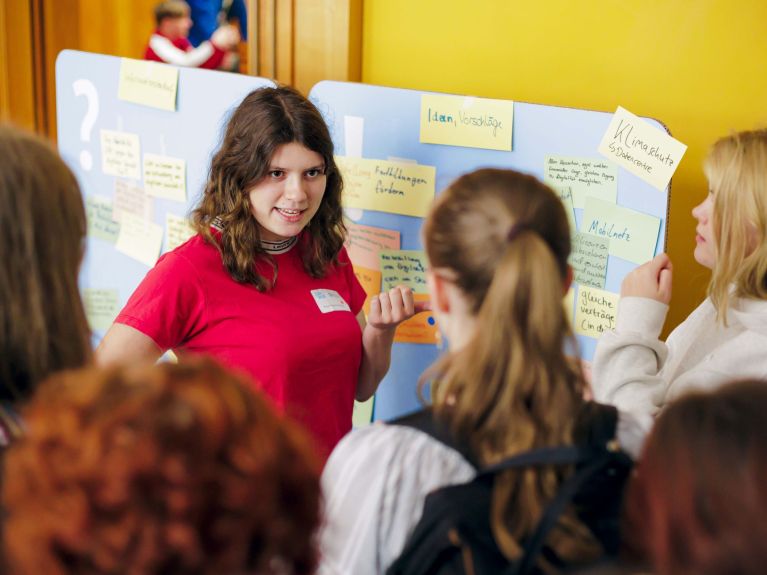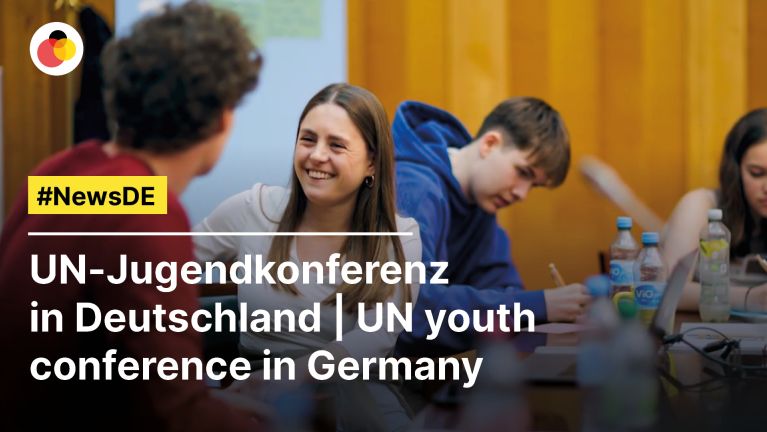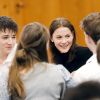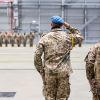Young people give UN fresh impetus
At the UN youth conference at the Federal Foreign Office in Berlin, school students discuss how they can get involved in global issues.

Sophia Longwe, 22, is reading Global Studies at Maastricht University. She is particularly concerned with the topic of digital governance. “A lot of young people around the world don’t really have good access to the internet. I said to myself: it surely can’t be right that in our generation – which is most active in the digital space and for whom the internet is an integral part of life – there are so many who can’t access it at all.” In order to change this situation, Longwe began to get politically involved. Last year, she travelled to Ethiopia as a youth observer for the German United Nations Association (DGVN) to represent German youth at the UN Internet Governance Forum that was held there. “Through this contact, I also became aware of the DGVN UN Youth Conference and immediately decided to get involved.”
Longwe is one of around ten workshop leaders who participated in the UN youth conference at the Federal Foreign Office on 15 and 16 June, giving the young participants the opportunity to delve deeply into a whole range of topics that are highly relevant to them, including migration, human rights, climate change and education. She herself worked with a highly committed group of about 30 students from all over Germany on questions relating to the digital living environment of young people. AI was a big topic, she says, as were fundamental issues concerning the regulation of the internet: why are there boundaries in a medium that once set out to break down boundaries? And who decides where and how these are drawn? “Young voices need to be heard in international politics,” adds Paulo Glowacki, 21, Longwe’s workshop co-leader and, like her, actively involved in the Internet Governance Forum. “The Federal Foreign Office is the place to be to achieve this.” As a student of international relations, he is now well acquainted with the structures of the United Nations. “If you get involved here, you can be pretty sure what you’re doing will get through to the United Nations as well.”
Dieses YouTube-Video kann in einem neuen Tab abgespielt werden
YouTube öffnenThird party content
We use YouTube to embed content that may collect data about your activity. Please review the details and accept the service to see this content.
Open consent formLots of opportunities for participation in Berlin
But how exactly is that supposed to work: getting involved as a young person? 18-year-old Mia took part in the workshop on human rights and freedom of expression. Although she feels that in many ways her voice is not sufficiently heard, she still finds it difficult to muster the energy to get involved politically: “Being a student is basically a full-time job.” Similar comments were heard at other workshops. Eric, 19, travelled to Berlin from Schleswig-Holstein with his upper secondary school geography course and attended the workshop on education and opportunities. You have to engage in discussion, he says, especially when it comes to challenges that can only be solved globally. “How do we benefit if some countries have achieved almost all the SDGs but hardly any progress has been made in the rest of the world, for example?” Nonetheless, he is still somewhat vague as to how he himself might get politically involved. There is one thing he is sure of, however: activism is out of the question as far as he is concerned.
A certain dissatisfaction with the current situation combined with a sense of uncertainty about what exactly can be done about it – this underlying mood was noticeable at many of the workshops. Antonia Kuhn, 28, who was responsible for the theme Peace and security, is not surprised. “I see the great benefit of the UN youth conference precisely in informing students and therefore empowering them to participate fairly actively after all.” Kuhn herself was involved as a German youth delegate at the UN General Assembly in 2018 and at the Youth 7 summit in Berlin in 2022 – the G7 youth participation process. “People keep claiming that Gen Z is apolitical. But that’s not true. It has simply moved into other spaces that have received too little attention from established politics to date.” There are lots of opportunities for participation, Kuhn says. “It’s just a question of raising awareness of these among young people.”

Dialogue with young people continues
One of the people to take on this task was Fidelis Stehle, the German Federal Youth Council’s delegate for sustainable development: his workshop was called “Living sustainably”. “There are UN youth delegates to the General Assembly, EU youth representatives, the BMZ Youth Advisory Council, youth observers to the Women’s Rights Convention and the World Health Conference, and youth delegates for sustainable development,” he told the students. “These are all structured and institutionalised programmes that you can easily apply for.” There are also a number of youth associations, such as the Major Group for Children and Youth (MGCY) – an association of children and youth at the UN level – as well as protest movements and citizens’ initiatives that seek to initiate change through demonstrations and petitions at the local level.
At the closing panel of the conference, Antonia Kuhn gave a good example of the power that youth associations might ultimately develop at UN level, too. The UN agenda for Youth, Peace and Security adopted in 2015 was largely due to the initiative of youth associations, Kuhn said. “The point at that time was to no longer think of peace merely as the absence of war but as a joint process of active participation. The fact that we were able to put this aspect onto the agenda was itself a huge achievement for young people.” Tobias Lindner, Minister of State at the Federal Foreign Office, agreed with her and promised to ensure that all the ideas from the conference which he regarded as important would be taken up by the Ministry. “The conference was certainly not a flash in the pan. We will continue to engage in dialogue with young people.”



